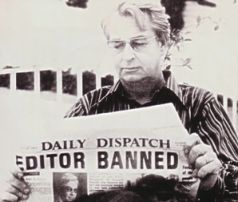
U.S. Rep Wants Assange Declared 'Banned Person,' Recalling South Africa's Internal Security Act
You, Donald James Woods, are declared a banned person, in terms of the Internal Security Act. Henceforth, and for a period of five years, you are forbidden to associate with more than one person at a time, or be in a room with more than person at a time, except for the members of your immediate family. You are forbidden to write anything, whether privately or for publication. You are forbidden to enter any printing or publishing premises of any kind, and are restricted for that five years to the Magesterial District of East London. --Banning order issued to editor Donald Woods, under the Internal Security Act, South Africa, October 1977 (Richard Attenborough's film, 'Cry Freedom') - USA PATRIOT Act's 'true' lineage.
From the The Reporters Committee for Freedom of the Press: U.S. rep wants WikiLeaks, founder added to banned list 14 Jan 2011 Although U.S. Rep. Peter King, R-N.Y., the chairman of the Committee on Homeland Security, wants WikiLeaks and its founder, Julian Assange, to be added to a special government list of entities and individuals that includes terrorist groups and drug trafficking organizations, the Treasury Department has reportedly declined to do so. King called Wikileaks a "clear and present threat to U.S. national interests," in a letter to Treasury Secretary Timothy Geithner. King sent the letter on Wednesday, asking that Assange and WikiLeaks be added to the department's "Specially Designated National and Blocked Persons List," also known as the SDN List.
Rep. Peter King's request brings to mind the story of another banned journalist, Donald James Woods. 'Donald James Woods, was a white South African journalist and anti-apartheid activist. As editor of the Daily Dispatch from 1965 to 1977, he befriended Steve Biko, leader of the anti-apartheid Black Consciousness Movement, and was banned by the government soon after Biko's death, which had been caused by serious head injuries, sustained while in police custody.' (Wikipedia)
The Donald Woods Foundation provides background on the journalist. 'By 1977 the Daily Dispatch had become the biggest-selling newspaper in the Eastern Cape, and was increasingly attracting the anger of the apartheid government for speaking out for the rights of the black majority and for attacking racial legislation. During the 12 years of his editorship Donald Woods was prosecuted seven times under apartheid’s publication laws and sentenced to jail -- all unsuccessfully. During the same period he took on the apartheid state in court, successfully suing on eight occasions for defamation, for implying that he was an enemy of South Africa or otherwise disloyal to the country.'
From Time, 'South Africa: Critic in Exile,' 16 Jan 1978: 'A government crackdown against political dissenters last October transformed South African Journalist Donald Woods into one of his country's silent men. In retaliation for his antigovernment editorials. Woods, 44, was "banned" for five years--which means that his movements were severely restricted, he was prohibited from returning to his job as editor of the East London Daily Dispatch and prevented from speaking with more than one person (except for family members) at a time. Government agents read his mail, bugged his home and phone, and kept him under general--if irregular --surveillance.'
The implementation of a banning order against the editor of WikiLeaks, Julian Assange -- or other journalists -- harkens to the days of rhe repressive policies of the Afrikaner National Party of South Africa. Banning orders should be banned.

Jan. 15, 2011
